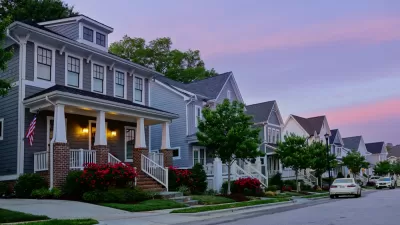Kelsey Campbell-Dollaghan discusses the plan put forth by three Raleigh architects to densify the city's pre-existing residential neighborhoods by creating a new RA-50 or "Alley Residential" zoning classification.
Raleigh has a predicament similar to other cities with outdated zoning laws, "newcomers are greeted by two equally unsustainable options for housing:
buying a large lot downtown; or buying a car and commuting from a more
affordable home in the suburbs," writes Campbell-Dollaghan.
As Raleigh drafts its "most dramatic zoning reforms ever," architect David Hill and his collaborators, Erin Lewis and
Matthew Griffith, of architecture firm In Situ, are proposing a new zoning classification that would allow the construction of alleyway residences. "In Situ and Hill propose divvying up existing lots into smaller parcels," explains Campbell-Dollaghan,
"suitable for smaller single- or double-occupancy homes."
"These new
parcels would yield a multiple bottom line. Current landowners could
generate income off their excess land by either selling an RA-50 parcel
or building a dwelling on one leasing it," they explain. "The city would
benefit from new utility service units evenly dispersed within an
existing downtown infrastructure, generating new income with minimal
investment in new infrastructure. Finally, the environmental benefits of
a more generous pedestrian environment."
"Along with their idea for a new type of zoning, the team developed a
prototype for a modular alley dwelling," says Campbell-Dollaghan. "Their prototype would cost
around the same amount as a new car."
FULL STORY: As A City Remakes Itself, Putting Forward A Quietly Radical Plan

Maui's Vacation Rental Debate Turns Ugly
Verbal attacks, misinformation campaigns and fistfights plague a high-stakes debate to convert thousands of vacation rentals into long-term housing.

Planetizen Federal Action Tracker
A weekly monitor of how Trump’s orders and actions are impacting planners and planning in America.

In Urban Planning, AI Prompting Could be the New Design Thinking
Creativity has long been key to great urban design. What if we see AI as our new creative partner?

Portland Raises Parking Fees to Pay for Street Maintenance
The city is struggling to bridge a massive budget gap at the Bureau of Transportation, which largely depleted its reserves during the Civd-19 pandemic.

Spokane Mayor Introduces Housing Reforms Package
Mayor Lisa Brown’s proposals include deferring or waiving some development fees to encourage more affordable housing development.

Houston Mayor Kills Another Bike Lane
The mayor rejected a proposed bike lane in the Montrose district in keeping with his pledge to maintain car lanes.
Urban Design for Planners 1: Software Tools
This six-course series explores essential urban design concepts using open source software and equips planners with the tools they need to participate fully in the urban design process.
Planning for Universal Design
Learn the tools for implementing Universal Design in planning regulations.
Gallatin County Department of Planning & Community Development
Heyer Gruel & Associates PA
JM Goldson LLC
City of Camden Redevelopment Agency
City of Astoria
Transportation Research & Education Center (TREC) at Portland State University
Jefferson Parish Government
Camden Redevelopment Agency
City of Claremont



























